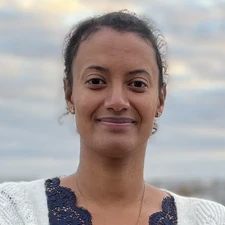Kristel Chanard

G Geodesy
The 2022 Division Outstanding Early Career Scientist Award is awarded to Kristel Chanard for outstanding contributions to the determination and understanding of Earth’s surface deformations.
The research work of Kristel Chanard is situated on the interface between geodesy and geodynamics establishing important links between these disciplines. Kristel has focused on the observation of non-tectonic deformations from space geodesy and on the modelling of the response of the Earth to surface mass redistribution. In addition to exploring hydrologically driven crustal stresses, she has investigated rheological constraints on time scale of a few decades up to seasonal periods and provided evidence of potential departures from elasticity. Because her studies are based on observations, Kristel always takes a critical look on space geodetic products. She investigated systematic errors in GNSS (Global Navigation Satellite System) station position time series to avoid over-interpreting observed seasonal signals. In a similar way, she co-signed a study on the spatio-temporal filtering of GRACE (Gravity Recovery and Climate Experiment) products. Indeed, as a measure of mass redistribution, GRACE products have shown to be a valuable data source in her work to investigate climate forcing on Earth deformation.
Furthermore, she is currently involved in the improvement of the International Terrestrial Reference Frame (ITRF) and has advanced our understanding of geocentre motion as an important source of uncertainty e.g. on the evaluation of sea-level rise. To reconcile forward modelling of geocentre motion due to non-tidal loading effects and space geodetic estimates from Satellite Laser Ranging (SLR) and GNSS, she has investigated the thermo-elastic deformation contribution both from an empirical and theoretical point of view. In this field she already has a leading role internationally, manifested by chairing a respective working group within the International Association of Geodesy. Complementary to her theoretical skills, Kristel is also an experienced field engineer having maintained and developed a GPS (Global Positioning System) station network in Nepal.
